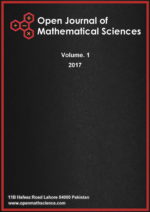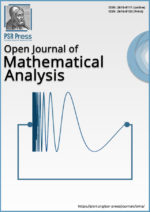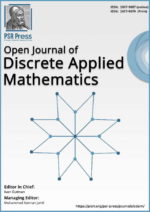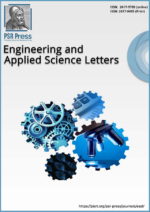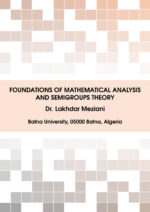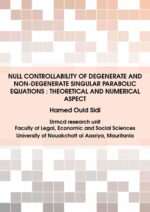Ptolemy Scientific Research Press (PSR Press)is a highly regarded publisher of scientific literature dedicated to bringing the latest research and findings to a broader audience. With a focus on cutting-edge research and technology, Ptolemy Scientific Research Press offers a range of publications catering to professionals, researchers, and student’s needs. Whether looking for information on the latest breakthroughs in physics, biology, engineering, or computer science, you can trust Ptolemy Scientific Research Press to deliver insightful, accurate, and engaging content. With its commitment to quality, accessibility, and innovation, Ptolemy Scientific Research Press is an essential resource for anyone interested in science and technology.

Latest Published Articles
ODAM-Vol. 3 (2020), Issue 1, pp. 55 – 74 Open Access Full-Text PDF
Paul Augustine Ejegwa
Abstract: The concept of fuzzy set theory is of paramount relevance to tackling the issues of uncertainties in real-life problems. In a quest to having a reasonable means of curbing imprecision, the idea of fuzzy sets had been generalized to intuitionistic fuzzy sets, fuzzy multisets, Pythagorean fuzzy sets among others. The notion of intuitionistic fuzzy multisets (IFMS) came into the limelight naturally because there are instances when repetitions of both membership and non-membership degrees cannot be ignored like in the treatment of patients, where each consultations are key in diagnosis and therapy. In IFMS theory, the sum of the degrees of membership and non-membership is less than or equals one at each levels. Supposing the sum of the degrees of membership and non-membership is greater than or equal to one at any level, then the concept of Pythagorean fuzzy multisets (PFMS) is appropriate to handling such scenario. In this paper, the idea of PFMS is proposed as an extensional Pythagorean fuzzy sets proposed by R. R. Yager. In fact, PFMS is a Pythagorean fuzzy set in the framework of multiset. The main objectives of this paper are to expatiate the operations under PFMSs and discuss some of their algebraic properties with some related results. The concepts of level sets, cuts, accuracy and score functions, and modal operators are established in the setting of PFMSs with a number of results. Finally, to demonstrate the applicability of the proposed soft computing technique, a course placements scenario is discussed via PFMS framework using composite relation defined on PFMSs. This soft computing technique could find expression in other multi-criteria decision-making (MCDM) problems.
ODAM-Vol. 3 (2020), Issue 1, pp. 41 – 54 Open Access Full-Text PDF
Abdullahi Ibrahim, Jeremiah Ishaya, Nassirou Lo, Rabiat Abdulaziz
Abstract: Capacitated vehicle routing problem is one of the variants of the vehicle routing problem which was studied in this research. In this research we applied a reinforcement learning algorithm to find set of routes from a depot to the set of customers while also considering the capacity of the vehicles, in order to reduce the cost of transportation of goods and services. Each vehicle originates from a depot, service the customers and return to the depot. We compare the reinforcement learning model with an exact method; column generation and Google’s OR-tool. Our objective is to solve a large-size of problem to near-optimality. We were able to use reinforcement learning to solve upto 101 nodes to near-optimality.
OMA-Vol. 4 (2020), Issue 1, pp. 49 – 59 Open Access Full-Text PDF
S. M. S. Cordeiro, R. F. C. Lobato, C. A. Raposo
Abstract: This work deals with a coupled system of wave with past history effective just in one of the equations. We show that the dissipation given by the memory effect is not strong enough to produce exponential decay. On the other hand, we show that the solution of this system decays polynomially with rate \(t^{-\frac{1}{2}}\). Moreover by recent result due to A. Borichev and Y. Tomilov, we show that the rate is optimal. To the best of our knowledge, there is no result for optimal rate of polynomial decay for coupled wave systems with memory in the previous literature.
OMA-Vol. 4 (2020), Issue 1, pp. 38 – 48 Open Access Full-Text PDF
Benharrat Belaïdi, Mohamed Amine Zemirni
Abstract: In this article, we give new conditions on the fast growing analytic coefficients of linear complex differential equations to estimate the iterated \(p\)-order and iterated \(p\)-type of all solutions in the unit disc \(\mathbb{D}\), where \(p\in \mathbb{N}\backslash \{1\}\).
EASL-Vol. 3 (2020), Issue 2, pp. 9 – 18 Open Access Full-Text PDF
Sajid Mehmood, Ghulam Farid,, Khuram Ali Khan, Muhammad Yussouf
Abstract: The aim of this paper is to establish some new fractional Hadamard and Fejér-Hadamard inequalities for exponentially \((h,m)\)-convex functions. These inequalities are produced by using the generalized fractional integral operators containing Mittag-Leffler function via a monotonically increasing function. The presented results hold for various kinds of convexities and well known fractional integral operators.
EASL-Vol. 3 (2020), Issue 2, pp. 1 – 8 Open Access Full-Text PDF
Fatima Asif, Zohaib Zahid, Sohail Zafar
Abstract: Topological indices are numerical parameters of a graph which characterize its topology. The second degree of a vertex in a graph is equal to the number of its second neighbors. In this paper, we will compute leap Zagreb indices and leap hyper-Zagreb indices of Jahangir graph and its line graph based on the 2-distance degree of the vertices. Moreover we will compute the same indices for the subdivision graph and the line graph of the subdivision of Jahangir graph.

